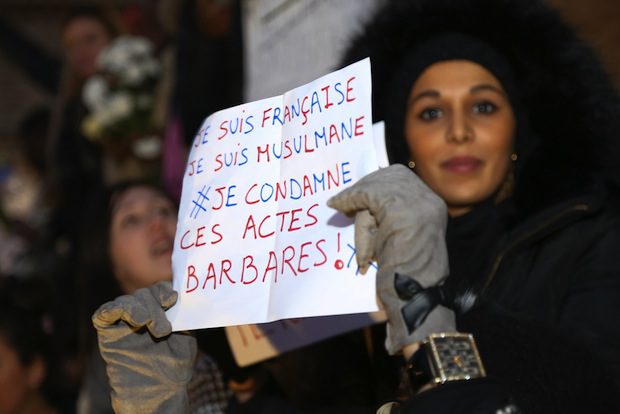Islam & France Headed For Clash

Well before the attacks, which left 17 dead, the French were discussing the possibility that tensions with the country’s own Muslim community were leading France toward some kind of armed confrontation.
Consider Éric Zemmour, a slashing television debater and a gifted polemicist. His history of the collapse of France’s postwar political order, “Le suicide français,” was No. 1 on the best-seller lists for several weeks this fall. “Today, our elites think it’s France that needs to change to suit Islam, and not the other way around,” Mr. Zemmour said on a late-night talk show in October, “and I think that with this system, we’re headed toward civil war.”
More recently, Michel Houellebecq published “Submission,” a novel set in the near future. In it, the re-election of France’s current president, François Hollande, has drawn recruits to a shadowy group proclaiming its European identity. “Sooner or later, civil war between Muslims and the rest of the population is inevitable,” a sympathizer explains. “They draw the conclusion that the sooner this war begins, the better chance they’ll have of winning it.” Published, as it happened, on the morning of the attacks, Mr. Houellebecq’s novel replaced Mr. Zemmour’s at the top of the best-seller list, where it remains.
More:
So impressed were the Europeans with their own generosity that they failed to notice that the population of second- and third-generation immigrants was growing bigger, stronger, more unified and less inclined to take moral instruction. This is partly a demographic problem. Since the fall of the Berlin Wall, Western Europe has had some of the lowest birthrates of any civilization on record. Without immigration, Europe’s population would fall by a hundred million by midcentury, according to U.N. estimates.
When mass immigration began, Europeans did not give much thought to the influence of Islam. In the 1960s, there might have been worries that a North African was, say, a Nasserite Arab nationalist, but not that he was a would-be jihadist. Too many Europeans forgot that people carry a long past within them—and that, even when they do not, they sometimes wish to. Materialistic, acquisitive, averse to God and family, Europe’s culture appeared cold, dead and unsatisfying to many Muslims. It failed to satisfy a lot of non-Muslims too, but until they ran out of borrowed money with the 2008 crash, they could avoid facing it squarely.
More:
And when Charlie Hebdo printed a memorial cover this week that had a picture of its controversial cartoon character “Muhammad” on it, it was as if the attacks had never happened: Muslim community spokesmen, even moderate ones, issued dire warnings about the insult to them and their coreligionists. To many Muslims in France and the rest of Europe, the new drawings were evidence not that the terrorists had failed to kill a magazine but that the French had failed to heed a warning. Impressive though the post-attack memorial marches were, “the working classes and the North African and West African immigrant kids weren’t there,” as the president of France’s Young Socialists told the newspaper Le Temps.
It may seem harsh to criticize the French in their time of grief, but they are responding today with tools that have failed them in previous crises. They reflexively look at their own supposed bigotry as always, somehow, the ultimate cause of Islamist terrorism, and they limit their efforts to making minority communities feel more at home.
Some random thoughts:
1. The stupidest mistake for François Hollande was freezing out Marine Le Pen. When the French government and mainstream parties fail to contain the radical Islam crisis, as they will, the French public will remember that Le Pen is not tainted by that failure.
2. What measures, exactly, are the French (and other European nations) supposed to take? I’m not asking this rhetorically; I would really like to know what is feasible. Spengler writes:
The means by which France could defeat the terrorists are obvious: To compel the majority of French Muslims to turn against the terrorists, the French authorities would have to make them fear the French state more than they fear the terrorists. That is a nasty business involving large numbers of deportations, revocation of French citizenship, and other threats that inevitably would affect many individuals with no direct connection to terrorism. In the short term it would lead to more radicalization. The whole project of integration as an antidote to radicalism would go down the drain. The effort would be costly, but ultimately it would succeed: most French Muslims simply want to stay in France and earn a living.
3. How are the French supposed to triumph over a people who hold strongly to a religion when they themselves have almost no religion, except for an ersatz secularism. Excerpt:
The numbers are grim. Last year, according to reports, more than one-third (35 percent) of France’s population and almost two-thirds (63 percent) of youth said they belonged to “no religion.”
Very few people, an estimated 1-in-20 of the French, regularly attend Mass anymore.
Father Innocent Feugna, an African deacon who toils at St Pierre de Guise in northern France, complained that his congregation in aging and dying out.
“Here I’m preaching to pensioners,” he lamented to BBC.
“In Cameroon, [the Catholic] Mass is animated, it’s alive — here [in France], services are still flat and cold. In Cameroon, the churches are full. We’ve got children. We’ve got adults, all ages. It’s completely different from France.”
Not only are France’s church-goers aging, so are church officials — the average priest in the country is now 75, forcing the importation of foreigners to conduct religious services.
“Young people have different aspirations,” Feugna stated. “Their interests lie elsewhere. The Church perhaps doesn’t have the right message for young people here.”
You can’t fight something with nothing. Where is the spiritual vitality in secularism and consumerism?
Subscribe for as little as $5/mo to start commenting on Rod’s blog.